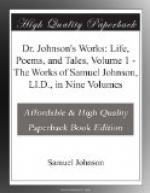“Yet let us not,” said the astronomer, “too arrogantly limit the creator’s power.”
“It is no limitation of omnipotence,” replied the poet, “to suppose that one thing is not consistent with another; that the same proposition cannot be, at once, true and false; that the same number cannot be even and odd; that cogitation cannot be conferred on that which is created incapable of cogitation.”
“I know not,” said Nekayah, “any great use of this question. Does that immateriality, which, in my opinion, you have sufficiently proved, necessarily include eternal duration?”
“Of immateriality,” said Imlac, “our ideas are negative, and, therefore, obscure. Immateriality seems to imply a natural power of perpetual duration, as a consequence of exemption from all causes of decay: whatever perishes is destroyed by the solution of its contexture, and separation of its parts; nor can we conceive how that which has no parts, and, therefore, admits no solution, can be naturally corrupted or impaired.”
“I know not,” said Rasselas, “how to conceive any thing without extension; what is extended must have parts, and you allow, that whatever has parts may be destroyed.”
“Consider your own conceptions,” replied Imlac, “and the difficulty will be less. You will find substance without extension. An ideal form is no less real than material bulk: yet an ideal form has no extension. It is no less certain, when you think on a pyramid, that your mind possesses the idea of a pyramid, than that the pyramid itself is standing. What space does the idea of a pyramid occupy more than the idea of a grain of corn? or how can either idea suffer laceration? As is the effect, such is the cause: as thought, such is the power that thinks; a power impassive and indiscerptible.”
“But the being,” said Nekayah, “whom I fear to name, the being which made the soul, can destroy it.”
“He, surely, can destroy it,” answered Imlac, “since, however unperishable, it receives from a superiour nature its power of duration. That it will not perish by any inherent cause of decay, or principle of corruption, may be shown by philosophy; but philosophy can tell no more. That it will not be annihilated by him that made it, we must humbly learn from higher authority.”
The whole assembly stood, awhile, silent and collected. “Let us return,” said Rasselas, “from this scene of mortality. How gloomy would be these mansions of the dead to him who did not know that he should never die; that what now acts shall continue its agency, and what now thinks shall think on for ever. Those that lie here, stretched before us, the wise and the powerful of ancient times, warn us to remember the shortness of our present state: they were, perhaps, snatched away, while they were busy, like us, in the choice of life.”
“To me,” said the princess, “the choice of life is become less important; I hope, hereafter, to think only on the choice of eternity.”




